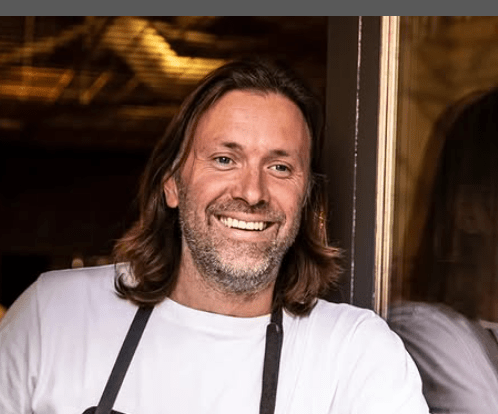Observing Niklas Ekstedt in the kitchen has a certain allure. In addition to using fire and flame to create food, he is blazing a trail toward a distinctive financial and cultural legacy. Magnus Nilsson, Mathias Dahlgren, and even the world-renowned Björn Frantzén have long served as Sweden’s culinary ambassadors, but Ekstedt has taken a distinctly different path. He went back to pre-electric methods instead of chasing the icy precision of molecular gastronomy. Ironically, such retrograde choice has significantly advanced his career and wealth.

Ekstedt’s personal income in 2021 was little over 1 million SEK, or around 84,000 SEK a month. Although that amount may not be comparable to Netflix royalties or Wall Street profits, it is incredibly respectable in the culinary arts, particularly outside of Michelin’s narrow sphere of influence. It not only shows how successful his brand is, but also how consistently he has managed it by making appearances on SVT, raising the profile of his restaurant, and becoming a mainstay on Swedish television.
Niklas Ekstedt: Personal and Professional Details
| Attribute | Details |
|---|---|
| Full Name | Niklas Ekstedt |
| Date of Birth | November 28, 1978 |
| Age (as of 2025) | 46 years |
| Birthplace | Järpen, Jämtland, Sweden |
| Profession | Chef, Restaurateur, TV Personality |
| Known For | Ekstedt restaurant, “Niklas Mat” TV show, open-fire cooking |
| Net Worth (Est. 2025) | Approx. $1.2 million USD (based on SEK and business earnings) |
| Annual Salary (2021) | SEK 1,010,100 (~$93,000 USD) |
| Business Revenue (2021) | SEK 3,032,000 with a profit of SEK 449,000 |
| Notable Training | Internship at El Bulli under Ferran Adrià |
| Restaurant | Ekstedt (Stockholm, Sweden) |
| Instagram Followers | Over 120,000 |
| Family | Married, father of two sons |
| Reference |
Since its 2011 opening, his restaurant “Ekstedt” in Stockholm has been one of the most avant-garde ideas in Nordic cuisine. Using only open fire for cooking instead of gas, electricity, or induction, his kitchen functions as a contemporary culinary cave. Every dish, from soot-blackened iron skillets to exquisitely served pine-smoked reindeer, reflects both tradition and creativity. His financial success can be attributed in part to that experience. In 2021, the restaurant’s sales exceeded 3 million SEK, and it had a healthy profit of 449,000 SEK. It wasn’t particularly impressive, but it was evidence of efficient operations and consistent creativity.
However, Ekstedt’s financial holdings go beyond his physical business. His brand equity has been greatly increased by his public awareness, which has been fostered by his long-running television series “Niklas Mat,” his guest appearances on food shows, and his current role as host of “Vilda Kockar.” Such presence directly translates into income in the culinary industry. Book agreements, endorsements, promoted content, and higher restaurant prices are the results.
Notably, his strategy is similar to that of international chef-entrepreneurs like Gaggan Anand and David Chang, who turned genuineness and individual expression into astute commercial ventures that capitalize on the media. Ekstedt’s decision to provide a more straightforward approach to Swedish primetime television has been very advantageous. It sets him apart in a time when a lot of famous chefs are perceived as becoming less involved in actual cooking.
His media and book sales are another important source of funding. Ekstedt has benefited from storytelling, much like Rachael Ray or Jamie Oliver. His cuisine embodies fire, history, and storytelling in addition to flavor. Publishers, networks, and marketers are particularly interested in that currency. Whether he is featured in cookbooks, Instagram, or Netflix’s “Chef’s Table: BBQ,” his image is always well-curated but never too polished. That genuineness is valuable, particularly in the trust-sensitive digital world of today.
With an estimated net worth of over $1.2 million, Ekstedt’s wealth is a combination of earned income, company profits, and brand value. His business “Niklas Ekstedt Restaurang AB” exemplifies a structure that is becoming more and more typical among chef-owners: a restaurant that serves as both an eating establishment and a lifestyle product. Collaborations, masterclasses, and even product licensing are all possible. Future revenue streams from open-fire grills, cooking utensils, or premade seasoning packets are easily envisioned.
Ekstedt’s ascent also has a strong cultural component. Ekstedt’s brand aligns with the national narrative as Sweden continues to embrace its culinary identity, which is strongly anchored in heritage and not only minimalist or seasonal. His approach, which emphasizes natural flavors and primal methods, reflects a larger Scandinavian revival in environmentally friendly and culturally sensitive food. It also speaks to movements around the world, such as Sean Brock’s Appalachian revivalism in the American South and Noma’s fermentation lab in Copenhagen.
Ekstedt’s career discipline also contributes to his financial security. He is especially careful, in contrast to some culinary celebrities who overexpand their brand. Instead of pursuing foreign franchises or adding numerous locations, he has remained philosophically and geographically true to his beginnings. This has preserved operations, reputation, and low overhead.
It’s quite similar to the way Ferran Adrià, Ekstedt’s mentor at the famous El Bulli, handled his legacy after leaving the restaurant. Rather than developing 20 tapas bars around the world, Adrià turned his focus to education and innovation labs. In a similar vein, Ekstedt’s preference for methods over fads might be a very powerful defense against the erratic nature of celebrity in the food industry.
Ekstedt’s emphasis on balance and family is another topic that is rarely brought up. He has maintained his groundedness in spite of his prominent media presence. Living in Stockholm and having two sons, he seemed to have avoided the scandal and burnout that frequently accompany famous chefs. From Mario Batali to Gordon Ramsay, a number of well-known restaurateurs have come under fire recently for their conduct, business ethics, or both. Ekstedt, on the other hand, presents a composed, accurate, and concentrated image that is not only very adaptable but also very dependable for viewers, sponsors, and producers.
